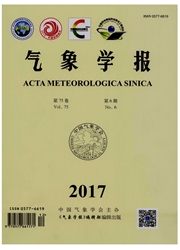

 中文摘要:
中文摘要:
利用一个描述实际数值天气预报模式中比湿在单格线上随时间发展的偏微分方程作为控制方程,研究分析了非线性滤波方法在含“开关”过程的资料同化中的有效性和可行性。首先在贝叶斯理论框架下,讨论了一般情形的非线性滤波方法,然后对基于粒子滤波(PF)和基于集合卡尔曼滤波(EnKF)的两种同化方法进行对比,由于EnKF是通过对集合成员的统计分析得到的误差分布的一阶矩和二阶矩来近似真实误差分布的,所以当用高斯分布近似真实误差分布所产生的误差较大时,基于EnKF的同化方法得到的结果也会有较大的误差。最后分别从观测算子为线性和非线性、观测误差为高斯型和非高斯型4种情形进行数值试验,结果显示当观测误差为高斯型时,无论观测算子为线性还是非线性,基于PF和基于EnKF的同化方法都能克服由“开关”过程给资料同化带来的困难,给出满意的同化结果;而当观测误差为非高斯型时,EnKF出现滤波不稳定,产生了非理想的同化结果,但PF方法仍然能够有效地发挥作用,给出满意的同化结果。
 英文摘要:
英文摘要:
Using an idealized model of partial differential equation with discontinuous "on off" switches in the forcing term, the feasibility and effectivity of the nonlinear filter in data assimilation with discontinuous physical "on-off" processes is investiga- ted. First, the general nonlinear filter algorithm was discussed in the Bayesian theory framework, then two kinds of assimila- tion approaches based respectively on the particle filter (PF) and the ensemble Kalman filter (EnKF) were analyzed and com- pared. Since the EnKF utilizes only first two statistic moments in the analysis step, it is able to deal with the noises with proba- bility density function well matching the Gaussian distribution, and will produce larger error when the true probability density functions badly approximated by the Gaussian distribution. Although the PF approximates the error distribution utilizing parti cles, it uses the whole error statistic moments, so it is able to deal with the problem caused by the non-Gaussian observation er- ror in the data assimilation. Last, numerical experiments are conducted for the four cases of linear and nonlinear observation operators, Gaussian and non-Gaussian observation errors. The assimilation results show that no matter the observation opera- tor is linear or nonlinear, both the PF and EnKF can overcome the difficulty brought by the discontinuous "on off" switches and obtain satisfying assimilation results in the case of Gaussian observation error. But for the non-Gaussian observation error; the PF is more effective with satisfactory results than the EnKF and the filtering being unstable during the process of assimilation using the EnKF.
 同期刊论文项目
同期刊论文项目
 同项目期刊论文
同项目期刊论文
 A Comparison Study of the Contributions of Additional Observations in the Sensitive Regions Identifi
A Comparison Study of the Contributions of Additional Observations in the Sensitive Regions Identifi Application of conditional non-linear optimal perturbations to tropical cyclone adaptive observation
Application of conditional non-linear optimal perturbations to tropical cyclone adaptive observation The impact of verification area design on tropical cyclone targeted observations based on the CNOP m
The impact of verification area design on tropical cyclone targeted observations based on the CNOP m The impact of assimilating dropwindsonde data deployed at different sites on typhoon track forecasts
The impact of assimilating dropwindsonde data deployed at different sites on typhoon track forecasts A Study on the Reduction of Forecast Error Variance by Three Adaptive Observation Approaches for Tro
A Study on the Reduction of Forecast Error Variance by Three Adaptive Observation Approaches for Tro The roles of spatial locations and patterns of initial errors in the uncertainties of tropical cyclo
The roles of spatial locations and patterns of initial errors in the uncertainties of tropical cyclo On the application of the genetic algorithm to the predictability problems involving on-off switches
On the application of the genetic algorithm to the predictability problems involving on-off switches The Impact of Horizontal Resolution on the CNOP and on Its Identified Sensitive Areas for Tropical C
The Impact of Horizontal Resolution on the CNOP and on Its Identified Sensitive Areas for Tropical C 期刊信息
期刊信息
